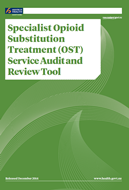
Summary
The Specialist Opioid Substitution Treatment (OST) Service Audit and Review Tool is aimed at auditing the practice of opioid substitution treatment (OST) as laid out in the Ministry of Health publications: New Zealand Practice Guidelines for Opioid Substitution Treatment 2014 (OST Guidelines) and National Guidelines: Interim methadone prescribing (2007).
The tool has been updated and complements the work completed over the last 5 years, which focused on providing the best possible service to clients and their families and whānau.
The Ministry of Health’s intention is for the Tool to help services that provide OST meet best practice guidelines and to improve practices that require further development. We hope that this, in turn, will boost confidence with OST service among clients, families, service providers, funders, the broader health sector and the general public.
The Tool is designed primarily to support an external audit/review process undertaken by an expert team. It does not provide all the micro-detail of what is required when planning the audit questions and focus points. Some discretion is required on the part of the lead auditor to determine who should be asked certain questions covered within the Tool; which questions might not be required, based on having seen the evidence within documentation, and whether multiple sources are needed in order to resolve certain questions, eg, observation, policy documentation and interviews.
What the Tool includes
Part A: Audit Report template
This template enables the audit team to provide a structured report on service performance against each section of the OST Guidelines.
For ease of reference, the audit report template is divided into sections that correspond directly with the sections in the OST Guidelines, even down to including indicators drawn from the corresponding section in the OST Guidelines. Any sections of the OST Guidelines that do not need to be audited are referenced as ‘no audit requirements’. Where necessary, to ensure the Tool is comprehensive and up to date, additional indicators have been drawn from feedback provided by the National Association of Opioid Substitution Treatment Providers (NAOTP).
Part B: Audit set-up and data-gathering tools
These are a series of tools provided to help the audit instigator set up the audit and the audit team gathers information for the report. Auditors may wish to tailor these tools to their specific audit context.
These set-up and data-gathering tools include:
- Opioid substitution treatment audit request form (Word, 26 KB)
- Documentation request form (Word, 32 KB)
- Service context information request form (Word, 29 KB)
- Documentation review tool (Word, 35 KB)
- Observation of facility tool (Word, 29 KB)
- Incident reports review tool (Word, 28 KB)
- Client records review tool (Word, 32 KB)
- Prescription audit tool (Word, 28 KB)
- Manager, team leader, lead clinician, staff interview tool (Word, 33 KB)
- Client interview tool (Word, 29 KB)
- Family / whānau / support person interview tool (Word, 27 KB)
- Pharmacists, authorised prescribers, Medicines Control, and other key interfaces/links interview tool (Word, 36 KB).
